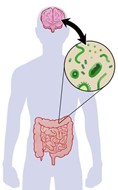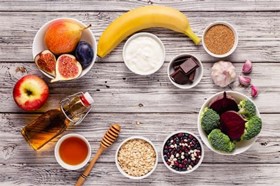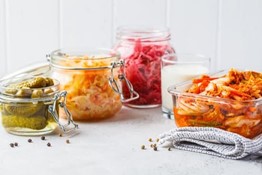Your Amazing Gut Microbiome

This blog is by our Nutritional Therapist Deborah Lethby who works from Attend2Health on a Monday and Tuesday morning. For more information give us a call on 01763 87 80 87.
The gut microbiome (or gut flora) has been quite a popular topic lately, but what exactly is it?
The gut microbiome is the collection of microorganisms including bacteria, fungi and viruses that are found within the gut and their overall genetic information. We actually have ‘microbiomes’ all over the body – in the skin, mouth, stomach, vagina, ears and nose too – like our body’s own ecosystem!
Facts about our gut microbiome (or gut flora)
- In total it weighs 2-5 pounds (1-2kg), roughly the weight of your brain!
- Laid end-to-end, our body’s bacteria would circle the earth 2.5 times
- There are 10 times more microbes in our bodies than human cells – so you are more bacteria than human!
- There are up to 5,000 species of bacteria in the human gut microbiome
- >99% of the genes in our bodies are microbial, numbering over 10 million
- Gut microbiota differ in obese individuals versus lean individuals
- Children living on farms usually have a wider ranging microbiome than those living in urban areas
Why is it there and what does it do?
- About 70% of our IMMUNE CELLS are located in the gut – an imbalance of good and bad bacteria, or gut dysbiosis, can affect the function of the immune system and may lead to autoimmune diseases.
- It helps us break down, digest and absorb our food
- It produces certain vitamins such as vitamin K, vitamin B12 and other B vitamins.
- The gut microbes turn fibre into something called Short Chain Fatty Acids (SCFAs) which can help protect the gut lining and lower inflammation
- Gut bacteria produce the brain chemicals GABA (calming), serotonin (happy hormone), dopamine (feel good hormone) and BDNF (like a fertiliser for brain cells).
So what can disrupt the balance of the microbiome?
Potentially pathogenic flora (‘bad bugs’) may be present at low levels without causing any issues, but they can overgrow and cause problems due to the following :
AGE – as we age, we tend to have lower levels of stomach acid, which is needed to kill off any pathogens as well as for digesting our food
STRESS – which may suppress our ‘friendly’ bacteria, allowing bad bacteria to overgrow.
TRAVEL – we can be exposed to unfamiliar germs and bacteria.
CAESAREAN/FORMULA FED – some studies show that babies born naturally and those being breastfed develop a wider range of ‘good’ bacteria due to exposure to the mum’s microbiome.
SUGAR/ALCOHOL – bad bacteria love to feed on sugar!
LACK OF FIBRE – fibre is what our friendly bacteria feed on, so we need plenty!
ANTIBIOTICS – although these are sometimes necessary, they can destroy ‘good’ bacteria as well as the bad guys
other MEDICATIONS – various medications such as PPIs (proton pump inhibitors) which reduce stomach acid can disrupt the microbiome and can interfere with absorption of certain vitamins and minerals.
EXCESSIVE HYGIENE – Some studies show that being exposed to nature outside can increase the diversity of the microbiome. Did you know there’s a microbe in soil called Mycobaterium vaccae that causes you to make more serotonin? So it seems that dirt can make you happy 🙂
The Gut-Brain Connection

We may have all experienced ‘butterflies’ in our stomach when we get nervous, or diarrhoea when stressed, so we can see that what’s going on in our brain can have an impact on our gut, but also issues with our gut can cause disturbances in our brain – in fact, the gut microbiome is sometimes referred to as our ‘2nd brain’ due to the huge effect it has on stress, mood, memory and behaviour.
As mentioned above, some of our brain’s neurotransmitters such as serotonin are made by gut bacteria.
Many studies have been published showing the links between the gut microbiome and mental health, and a 2019 review in Nutritional Psychiatry contains a whole section on the importance of the microbiome, linking its involvement in ADHD, ASD and anorexia, stress, anxiety, depression and cognition.
There are also numerous studies showing the importance of a healthy microbiome and how it can help those with Parkinson’s Disease, Alzheimer’s Disease and Motor Neurone Disease.
An NHS source states that ‘70.9 million prescriptions for antidepressants were given out in 2018, compared with 36 million in 2008’ (NHS Digital1)
– Maybe in future doctors could look to prescribe probiotics or a stool test!

So what are the best gut-friendly foods?
- Eat a RAINBOW! e.g. The Mediterranean-style diet – plenty of variety of veggies, herbs, spices, olive oil, oily fish – containing plenty of antioxidants and polyphenols (e.g. berries, cocoa, beans, nuts, artichokes, red wine)
- Omega 3 fats – oily fish, olive oil, nuts, seeds
- Fibre – in oats, beans, pulses, fruit and vegetables such as garlic and onions, jerusalem artichokes, rye and barley, which are all prebiotics so feed the good bacteria.
- Resistant Starch which is fuel for the gut bacteria – found in foods such as green bananas, cooked and cooled potatoes, seeds and grains.
- Probiotic foods like kefir, sauerkraut, kimchi & yoghurt
- Bone Broth which contains collagen – this is great for the health of the gut lining
- Water! Being hydrated helps us to have regular bowel movements, preventing constipation and aiding digestion of our food.

What Should We Avoid if we want to keep our Microbiome Healthy
- A high fat diet (saturated fats generally) can decrease/eliminate certain gut protective ‘good’ bacteria.
- A high sugar diet – pathogens love to feed on sugar
- Processed foods
- Gluten – Non-coeliac gluten sensitivity (NCGS) is common and may cause gut dysbiosis. Gluten can trigger gut permeability.
- Antibiotics (where possible) – wipe out good bacteria as well as bad
- Stress (where possible!) and eating too quickly. Finding ways to deal with stress (our ‘fight or flight’ response) can help such as practising yoga/meditation/tai chi – helping us to activate our parasympathetic (rest and digest) system.
What we can tell from gut testing
Stool testing can tell us a great deal, including giving us a picture of our microbial diversity, our likelihood of having gut permeability, to assess inflammatory bowel disease, and to see if we have any yeast, parasites or disruptive bacteria present.
If you’d like to know more about how to improve your gut microbiome or digestive health in general, contact Deborah at Attend2health. https://www.attend2health.co.uk/index.php/nutritional-therapy/
Deborah’s e-book of gut-friendly recipes is available free by clicking on this link https://mailchi.mp/2e5b2896da45/39vpxqz15s or going to her instagram page @nutrissentialnutrition
References:
- https://www.ncbi.nlm.nih.gov/pmc/articles/PMC4191858/ 20 Things you didn’t know about the human gut Microbiome
- https://www.nih.gov/news-events/news-releases/nih-human-microbiome-project-defines-normal-bacterial-makeup-body
- https://www.metlife.com.au/content/dam/metlifecom/au/360health/health-resources/amazing-facts-about-your-gut-flyer_201910F.pdf
- https://depts.washington.edu/ceeh/downloads/FF_Microbiome.pdf
- https://connect.uclahealth.org/2021/03/19/want-to-boost-immunity-look-to-the-gut/
- https://www.ncbi.nlm.nih.gov/pmc/articles/PMC3144392/#:~:text=Thiamine%2C%20folate%2C%20biotin%2C%20riboflavin,also%20synthesized%20by%20gut%20bacteria.
- https://www.ncbi.nlm.nih.gov/pmc/articles/PMC7005631/
- https://pubmed.ncbi.nlm.nih.gov/8612992/#:~:text=The%20decline%20in%20acid%20secretion,predictor%20of%20reduced%20pepsin%20output.
- https://www.ncbi.nlm.nih.gov/pmc/articles/PMC7213601/
- https://www.henryford.com/blog/2020/06/antibiotics-and-probiotics-how-medications-affect-your-gut#:~:text=A%3A%20Taking%20antibiotics%20can%20dramatically,recommend%20taking%20antibiotics%20with%20food.
- https://www.ncbi.nlm.nih.gov/pmc/articles/PMC6580352/
- https://onlinelibrary.wiley.com/doi/abs/10.1111/all.14877
- https://pubmed.ncbi.nlm.nih.gov/29161087/#:~:text=The%20original%20version%20of%20the,Helicobacter%20pylori%2C%20or%20Toxoplasma%20gondii.
- https://www.healthline.com/health-news/how-your-kids-microbiome-can-be-affected-when-they-play-outside
- https://www.ncbi.nlm.nih.gov/pmc/articles/PMC2515351/
- https://www.bmj.com/content/364/bmj.l1508.full
- https://www.sciencedirect.com/science/article/pii/S0924977X19317237
- https://pubmed.ncbi.nlm.nih.gov/30655101/
- https://medicalxpress.com/news/2020-11-link-alzheimer-disease-gut-microbiota.html
- https://www.nutrition-evidence.com/article/29882798?term=gut%20brain&page=2
- https://www.nutrition-evidence.com/article/29868601?term=gut%20brain&page=2
- https://www.ncbi.nlm.nih.gov/pmc/articles/PMC6378305/
- https://www.sciencedirect.com/science/article/pii/S0924977X19317237?fbclid=IwAR0NqUi9IRR9wXv4vZs6CfHOUBBsxTqvk9N8O1pwN-EWSovBzObd-L-0AJQ
- https://www.ncbi.nlm.nih.gov/pmc/articles/PMC6835310/
- https://invivohealthcare.com/education/articles/gut-health-and-microbiome-stool-test/
Louise Hampton
Related Posts
Latest Feedback
Google Rating
5.0 208 reviews
-
Emma Azzopardi ★★★★★ 2 months ago
I’ve attended the clinic with my newborn baby for cranial osteopathy to help with his silent reflux and wind, which is prevalent … More in c-section babies. The treatment has been a game changer in releasing trapped air and pockets of discomfort for him. Meghan is very gentle and has works wonders for my baby. Highly recommend! The photos show just how relaxed my son is by the end of the cranial osteopathy treatment. -
Wayne Richards ★★★★★ 4 months ago
I've been seeing Homman for a few weeks. I could hardly walk with sciatica before going in. The treatment has been exceptional. … More He's very knowledgeable and puts you at ease. The front desk staff are always very helpful too. I fully recommend attend2health. -
Sid Sampson ★★★★★ 2 months ago
Joanne was really helpful today with my knee. She listened carefully to my problem, and was extremely thorough with her investigation. … More She also gave me a science lesson which helped me to understand my pain and how to safely help it heal.

